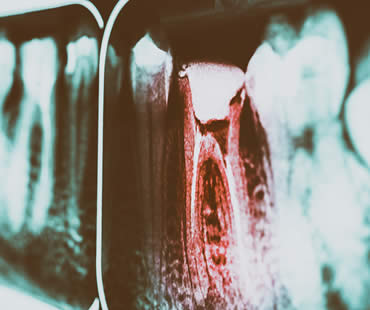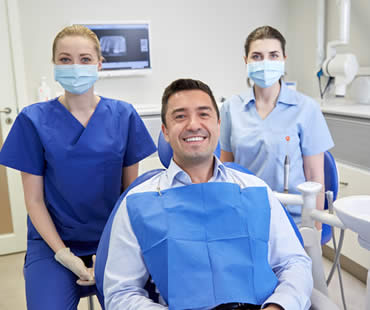
The desire for a beautiful, healthy, natural smile is universal. Dental procedures such as root canal treatments aren’t something people aspire to have, and there are things you can do personally that can reduce your risk of having a root canal procedure.
Prevention is the best step you can take to avoid root canal therapy, and it all begins with you at home. If you didn’t grow up with good oral hygiene habits, now is the time to develop them. This simple step can lead directly to good oral health. Be sure you are brushing your teeth at least twice a day, following each meal if possible, and absolutely before sleeping. If you don’t brush your teeth before bedtime, you’re providing a robust breeding ground for bacteria to grow and degrade your teeth while you’re sleeping. Floss daily to reach the places between teeth and beneath the gum line that brushing can’t reach.
Fluoride in your toothpaste and in mouthwash can keep your tooth enamel strong and durable. Never give fluoridated toothpastes to children under the age of two years and avoid fluoridated mouthwash until the child is more than six years old.
Maintaining a proper diet ensures that your body is receiving all of the nutrients it needs for health, both orally and elsewhere in the body. Chewing crunchy foods like raw vegetables and hard fruits can help keep your teeth bright and clean, scraping away debris while you chew.
If you are a smoker, you should stop immediately. Not only is it a huge factor in your oral health, but also for your overall health. Smoking contributes directly to lung disease, cancer and heart disease, as well as other health issues. Your dentist or doctor can give you excellent advice about quitting.
Stay hydrated by drinking lots of water and avoiding sugared drinks. Rinse your mouth after consuming soda, coffee, tea or a sports drink.
Be sure to see your dentist twice a year for regular check-ups and cleanings, and keep your risk of a root canal treatment low.
If you live in the Longview area contact us today

Root canal therapy is a painless procedure performed when decay has caused enough damage to a tooth that the tooth is dying or has already died. During treatment, your dentist or endodontist removes the diseased or damaged pulp from the tooth and then refills the tooth cavity. To ensure a successful and pleasant treatment, here are some basic do’s and don’ts to follow:
- Do take any medication your dentist has prescribed for you to take prior to root canal therapy.
- Don’t anticipate pain; be calm and relaxed during your treatment.
- Do expect mild discomfort for 2-3 days following the procedure. Apply an ice pack and sleep with your head elevated to minimize swelling.
- Don’t skip on taking prescribed pain medications, even if you are not experiencing extreme pain.
- Do avoid biting on hard foods or meddling with the affected tooth during the course of treatment.
- Don’t drink excessively hot or cold beverages until the completion of treatment.
- Do continue normal brushing on the root canal treated tooth.
- Don’t smoke or drink alcohol within 24 hours of root canal therapy.
- Do eat a soft diet for several days and avoid chewing on the treated tooth until a permanent restoration is placed.
- Don’t delay having the treated tooth capped with a crown or other restoration to avoid fracture or additional damage, causing failure of your root canal therapy.
- Do contact your dental professional immediately should you have any complications or questions during your recovery, and make sure to keep any follow-up appointments scheduled by your dentist or endodontist.
Root canal therapy has a 95% success rate. By following these simple guidelines, you can help to ensure a positive result from your root canal therapy and enjoy many more years of a healthy smile.
Schedule your appointment at our Longview dental office

Cosmetic dentistry offers many types of procedures, from porcelain veneers to teeth whitening or bleaching. Whether you are doing something more involved, like a restorative dental bridge and crown treatment, or something more straightforward, such as veneers, you should know what lies in store for you as you pursue your smile goals.
You should begin by talking to your cosmetic dentist. This is the time for you to be honest with your dentist about any changes you’d like to see in your smile. Don’t be embarrassed to discuss your true feelings; your cosmetic dentist is here to help you achieve your dream smile. If you are healthy overall, virtually nothing can stand in the way of you and your ideal look if you are in the hands of a skilled cosmetic dentist.
If you are getting your teeth whitened or are receiving veneers, you will need to clean your teeth beforehand. Removing the plaque and bacteria from the surface of the tooth is extremely important toward achieving even whitening results. Veneers that trap bacteria beneath them are perfect environments for infection. Having a thorough cleaning ensures that your veneers will be properly bonded to the tooth surface and you can enjoy your new look with confidence.
Many cosmetic dentistry therapies are achieved through some kind of oral surgery. In order to have the best possible experience, follow all of the instructions given to you by your surgeon. Make arrangements for someone to take you home following surgery, as you will not be able to drive safely. Have your medications ready and begin taking them as soon as recommended. Eat only foods recommended by your surgeon as your mouth heals.
Braces also require a full check-up and thorough cleaning. After the braces are applied or following any adjustments, your mouth may be sore. Have ibuprofen on hand to help with the swelling and specialized orthodontic wax to protect your sensitive soft tissues.
Talk to your cosmetic dentist about your procedure to see what recommendations are best for you and your treatment.
We treat patients from Longview and the surrounding area

Have you been told that you may need a root canal treatment? Are you worried because of things you’ve heard in the media about how “awful” a root canal is? Don’t worry about what you’ve heard; endodontic therapy isn’t at all what you’d think. Let’s debunk some myths!
- Myth #1: Root canal treatment is very painful. This isn’t true! In fact, a root canal treatment is performed specifically to relieve a patient’s pain, not to cause more. After a root canal treatment, you might feel some tenderness, but the pain you felt when the damaged tissue and infection was still inside the tooth will be completely gone. Once the swelling from the procedure has gone down, you will be able to use your new tooth exactly the way you could use your natural tooth when it was completely healthy.
- Myth #2: Root canal therapy or other endodontic work can lead to disease elsewhere in the body. Another falsehood! Root canal treatments don’t spread disease to the rest of the body, rather, they remove infected tissue and bacteria from the body, preventing the affected tooth from becoming re-infected.
- Myth #3: Extraction is better than root canal treatment. Extraction is not preferred to root canal treatment! Whenever possible, it’s preferred to keep your natural tooth. Your natural tooth’s roots stimulate and preserve the bone of your jaw, as well as providing adequate support to the surrounding teeth. Dental implants or dental bridges can be problematic, both in function and in dietary restrictions. In fact, an extraction can lead to several prolonged appointments to perform replacement procedures, treatments that are far more involved than a root canal treatment.
Endodontic treatment is an extremely common dental procedure that can provide durable, long-lasting restorations that will function as your natural tooth did. If you believe you may need a root canal treatment, talk to your endodontist or dentist today to see how this successfully proven treatment can help you and your smile needs.
If you need a dentist in Longview contact us today

A tooth that has been damaged by decay or trauma may need endodontic treatment, also called root canal therapy, in order to save the tooth. Although it may sound like a scary procedure, advances in dentistry have made it a much less painful or upsetting process than it used to be. This treatment is worth it to restore your smile as naturally as possible.
How do you know you might need endodontics? You may experience pain in the tooth, sensitivity to hot or cold foods or beverages, or swelling in the area. Severe cases may have a discharge of pus near the tooth. However, not all cases of a badly damaged tooth result in noticeable symptoms. That’s one reason it’s important to maintain regular checkups with your dentist, who will pick up on problems with a tooth that you may not realize is damaged. Examination and testing such as X-rays can help diagnose a tooth that is in dire need of repair.
When possible, dentists strive to save your real tooth. Sometimes the best way to do that is through root canal therapy, which involves removing the damaged tooth pulp from the interior of the tooth. Using local anesthesia to make you comfortable, the dentist or endodontist uses special tools to enter the root canal, remove the pulp, and clean the area thoroughly. Once the tooth is ready, a crown is usually placed on top of the existing tooth to protect it from future damage and to complete the process. Sometimes antibiotics are prescribed if an infection was present to help ensure that you are in the best of health.
Endodontic treatment is often compared by patients to simply getting a regular tooth filling. The procedure is usually completed in one office visit and it won’t be long before you are back to your normal routine, with a fully restored natural tooth in your smile.
If you need a dentist in Longview contact us today

If you or a loved one is scheduled to have or has recently had oral surgery, you probably have a lot of questions. Here are some of the most common questions:
- One of my stitches came out after my surgery, should I be worried? Losing a stitch isn’t a problem. In the majority of cases, stitches are put in place during surgery to assist in clot formation and bleeding control. If you have undergone a bone-graft procedure, however, contact your surgeon because you may need to be seen immediately.
- What can I eat after surgery? Immediately following surgery, eat only soft foods of tepid temperature. Avoid very hot or very cold foods. Eat nothing that is crunchy or chewy so you won’t damage the surgical site.
- I am having a lot of pain following my procedure, what should I do? If you have been prescribed pain medication, take it as recommended. If no prescription was given, use over-the-counter medicines containing natural anti-inflammatory properties such as ibuprofen. Stay hydrated by drinking room temperature water and get plenty of rest.
- I had a tooth extracted, how can I tell if I have a dry socket? Dry socket is the result of the loss of the blood clot present in the extraction site. Smoking, using a straw, poor oral hygiene or failure to rest properly following the extraction procedure can lead to this condition. Typically dry socket will present within one week of extraction and is treated with sterile wash and pain-relieving, medicated gauze.
- I had a procedure this morning and am still bleeding. Is that normal? Bleeding following extractions or other surgical procedures is common. If you are bleeding more than normal, bite down on some sterile gauze or a damp teabag for twenty or thirty minutes. Don’t keep removing the gauze to look for blood; that can make the bleeding worse. Call your surgeon if you feel your bleeding is excessive.
Your oral surgeon can answer these questions and more. Don’t hesitate to call the surgeon’s office to get the peace of mind you require to heal comfortably following your procedure.
Schedule your appointment at our Longview dental office









